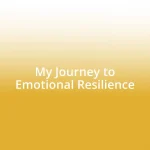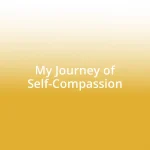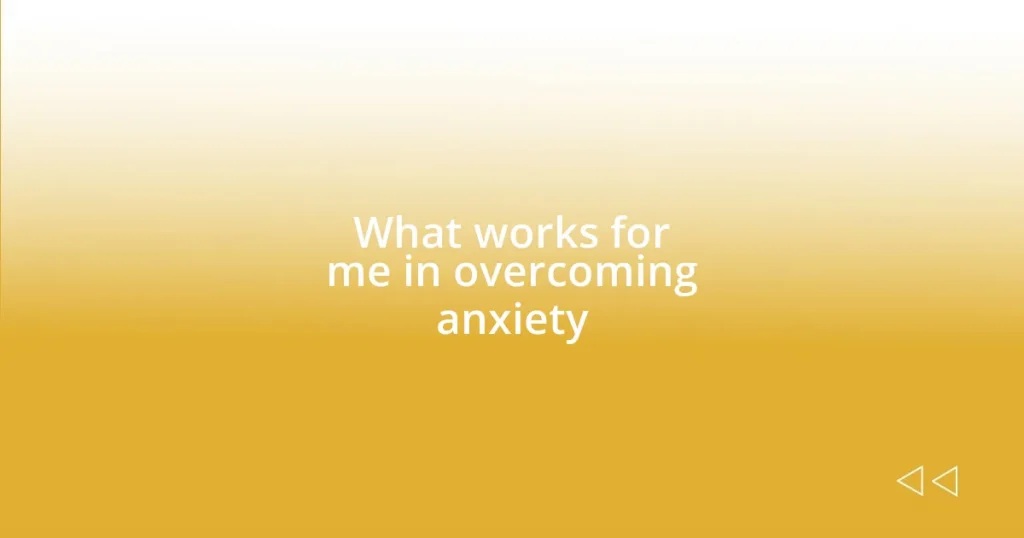Key takeaways:
- Identifying personal anxiety triggers through reflection and journaling can lead to greater self-awareness and control.
- Developing coping strategies, such as mindfulness meditation, deep breathing, and maintaining a structured routine, effectively manages daily anxiety.
- Building a supportive network of friends, family, and communities provides valuable emotional support and diverse perspectives to tackle anxiety.
- Incorporating physical activity and prioritizing a balanced lifestyle, including sleep and nutrition, significantly contributes to alleviating anxiety.

Understanding anxiety triggers
Identifying anxiety triggers is a deeply personal journey. I remember a time when I would feel an overwhelming wave of panic each time I walked into a crowded room. It dawned on me that my discomfort stemmed not just from the crowds but also from the fear of judgment. Have you ever noticed how certain situations spark that familiar unease within you?
It’s fascinating how our triggers can be as unique as our fingerprints. For me, one unexpected trigger was late-night scrolling on social media. The endless stream of curated lives often left me feeling inadequate and anxious about my own life. What about you? Have you ever found yourself spiraling into anxiety after consuming certain types of content?
Understanding these triggers is not just about recognition; it’s about taking control. By keeping a journal, I discovered patterns I hadn’t noticed before. It’s intriguing to reflect on how our mind works—how a simple event can lead to a cascade of anxious thoughts. Have you considered documenting your own experiences to identify your triggers? It might just offer the clarity you need.

Developing coping strategies
Developing effective coping strategies is essential for managing anxiety daily. For instance, I’ve found that practicing mindfulness meditation significantly calms my racing thoughts. Initially, I struggled to focus, but over time, it became a sanctuary where I could observe my feelings without judgment.
Another technique I lean on is deep breathing. Whenever I feel the tension building, just a few minutes of intentional breathing helps me regain composure. I remember a moment when I had to give a presentation, and instead of letting anxiety take over, I paused to breathe. It transformed my outlook and improved my performance.
Finally, creating a structured routine can be incredibly valuable. I’ve realized that having a predictable schedule offers me a sense of control. This structure helps minimize unexpected stressors that might heighten anxiety levels. How do you feel about establishing patterns in your daily life to cope with anxiety? It’s something worth considering for its profound impact.
| Coping Strategy | Effectiveness for Me |
|---|---|
| Mindfulness Meditation | Helps calm racing thoughts and fosters awareness |
| Deep Breathing | Restores composure during stressful moments |
| Structured Routine | Provides predictability and reduces unexpected stress |

Practicing mindfulness techniques
Practicing mindfulness techniques has truly reshaped my relationship with anxiety. One evening, after a particularly stressful day, I decided to sit in silence for just five minutes, focusing on my breath. The moment I brought my awareness back to the present, I felt the weight of my worries begin to lift. It’s remarkable how being fully present can transform a chaotic mind into a calm space.
Here are some mindfulness techniques that have worked for me:
- Body Scan Meditation: Lying down and mentally noting each part of my body helps me release tension and reconnect with myself.
- Walking Meditation: Taking a slow, deliberate walk in nature allows me to absorb my surroundings, making me feel more grounded.
- Mindful Eating: Savoring every bite during meals has not only improved my relationship with food, but it also brings me back to the present moment.
These practices have become my reliable tools for navigating anxiety, turning moments of stress into opportunities for mindfulness.

Building a support network
Building a support network has been a game-changer in my journey with anxiety. I recall a challenging time when I felt overwhelmed, and just reaching out to a trusted friend made a world of difference. Having someone to listen, share, and understand can turn a heavy burden into something more manageable. Have you ever experienced that release when someone simply acknowledges your struggles? It’s powerful.
In my experience, it’s not just about finding any support; it’s about surrounding myself with people who genuinely uplift and encourage me. I remember forming a small group where we could openly discuss our feelings. The camaraderie was palpable, and each gathering became a safe haven, reminding us that we’re not alone in our battles. How often do you surround yourself with encouraging voices? It can truly shift your perspective.
Moreover, I learned the importance of mix and match when building my network. I sought different types of support—family, friends, even online communities. Each offered unique insights and comfort, which enriched my coping toolkit. Reflecting on this, I wonder, do you have a diverse support system? Embracing various connections allows for a richer, more nuanced understanding of anxiety’s nuances.

Incorporating physical activity
Incorporating physical activity into my routine has been vital in managing my anxiety. I still remember the first time I laced up my sneakers and headed out for a jog. It felt tough at first, but as the rhythm of my feet hit the pavement, I felt a surge of energy that slowly began to replace my worries. The endorphins kicked in, and suddenly, my to-do list seemed less daunting. Have you ever noticed how moving your body can shift your mindset?
On days when my anxiety feels particularly heavy, I find solace in a simple workout, even if it’s just a quick home routine. I recall one afternoon, feeling unusually restless, when I decided to follow an online yoga session. It was nothing flashy, just me and my yoga mat. As I moved through the poses, I could feel my breath syncing with my movements, which beautifully grounded me in the moment. Isn’t it fascinating how physical activity can help break the cycle of anxious thoughts?
Additionally, I’ve discovered that group activities can amplify the benefits of exercise. Joining a local hiking group not only got me moving but also connected me with others who shared similar struggles. I remember embracing the laughter and the shared sense of accomplishment at the summit of a challenging trail. That exhilarating mix of fresh air and companionship made those moments worthwhile. Have you thought about how socializing during physical activity could uplift your spirits? Having exercise buddies can transform a solitary task into a joyous experience, reminding us that we’re all in this together.

Utilizing professional help
Utilizing professional help has been an essential part of my journey in battling anxiety. I can vividly recall the first time I stepped into a therapist’s office feeling nervous yet hopeful. It was a safe space where I could unveil my struggles, explore my thoughts, and, most importantly, learn coping strategies tailored to my needs. Have you ever had a conversation with someone who truly listened? That profound connection made all the difference for me.
As I navigated my options, I discovered the benefits of different therapeutic approaches. I tried cognitive-behavioral therapy (CBT), which helped shift my negative thought patterns. There was a moment during a session when my therapist guided me through a thought exercise that illuminated how I often spiraled into self-doubt. It was an eye-opener. Have you explored how therapy can directly address your thoughts? Understanding my mental processes has empowered me to manage my anxiety more effectively.
Moreover, I found that making the most out of therapy involved actively participating in the process. I remember setting goals with my therapist—a tangible way to measure my progress. Each time I accomplished one, no matter how small, it felt like a victory worth celebrating. Isn’t it fascinating how setting achievable targets can motivate change? Through professional support, I not only found tools to combat anxiety but also a sense of direction that had previously seemed elusive.

Maintaining a balanced lifestyle
Maintaining a balanced lifestyle has become a cornerstone in my battle against anxiety. I recall a particularly stressful week when everything felt out of control. I made a conscious effort to prioritize my sleep, carving out time to wind down each evening. The next morning, I woke up feeling equipped to handle the day’s challenges. Have you ever noticed how rest can reset your mindset?
Nutrition plays a vital role, too. There was a time when I reached for comfort food in moments of stress, but I realized how much better I felt after nourishing my body with wholesome meals. One evening, I decided to cook a colorful stir-fry loaded with vegetables; the vibrant colors sparked joy, and each bite felt rejuvenating. Isn’t it amazing how what we eat can influence our mood and energy levels?
Moreover, I’ve learned to balance work and relaxation intentionally. Setting boundaries at work was tough; I can remember feeling guilty for logging off at a decent hour. However, once I embraced that guilt and redirected my energy towards hobbies that bring me joy, like painting or reading, I found my anxiety lessened. How often do we forget the importance of downtime? A balanced lifestyle is not just about what we do, but how we allow ourselves to unwind and enjoy life.















